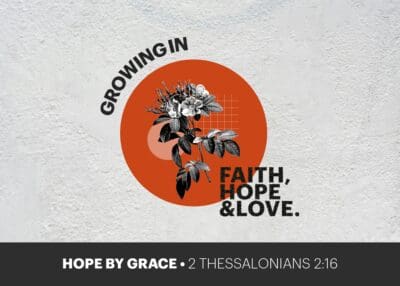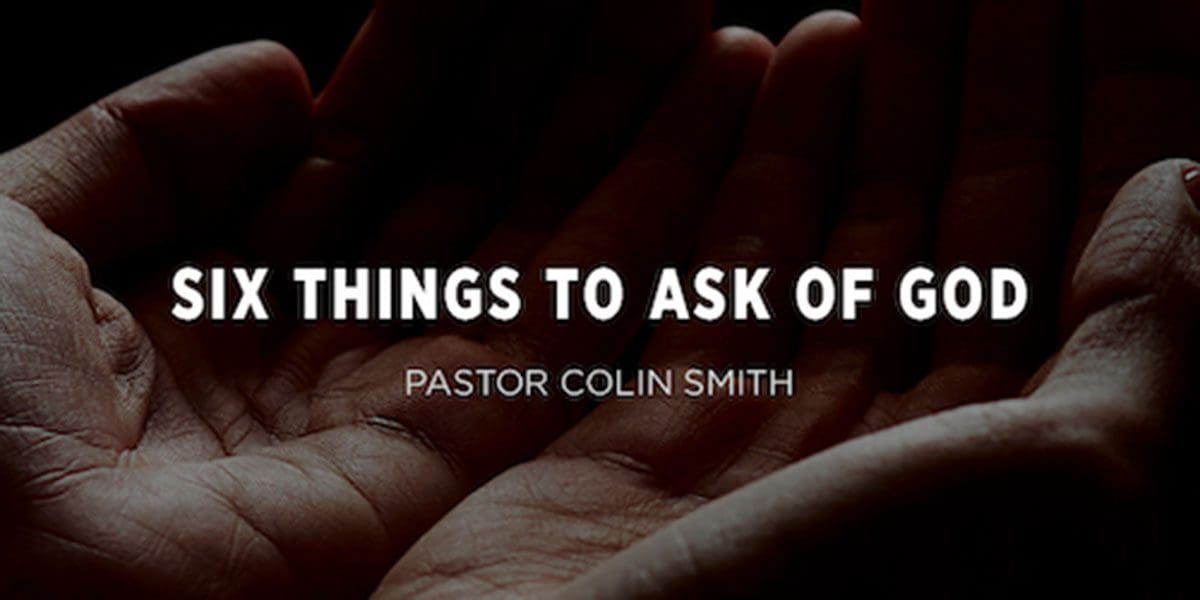This sermon is part of the series, Take Two.
“This is the blessing that Moses the man of God pronounced on the Israelites before his death.” (Deuteronomy 33:1)
The book of Deuteronomy records the last words of Moses to God’s people as they were about to enter the Promised Land. Moses had served these people for 40 years. He had led them out of Egypt, given them God’s law and he had endured the long years of wandering in the desert.
But Moses will die before they enter the Promised Land. Moses climbs Mount Nebo and God shows him the land (34:1). Then God says, “This is the land I promised on oath to Abraham, Isaac and Jacob… I have let you see it with your eyes, but you will not cross over into it” (34:4).
Then we read, “Moses the servant of the LORD died there in Moab, as the LORD had said. He buried him in Moab, in the valley opposite Beth Peor, but to this day no one knows where his grave is (34:5).
Chapter 33 gives us the last recorded words of Moses. And it’s very significant that the whole chapter is full of the blessing of God, “This is the blessing that Moses the man of God pronounced on the Israelites before his death” (33:1).
Moses gives a blessing to each of the tribes of Israel: Rueben (33:6), Judah (33:7), Levi (33:8), Benjamin (33:12), etc. The blessings lead, in a great crescendo, up to Moses’ final words, “Blessed are you O Israel! Who is like you, a people saved by the Lord…” (33:29)? I want you to see and to savor this blessing that is yours, or can be yours, in Jesus Christ.
What does it mean to be blessed?
What does this look like? Moses was raised in the palace of Egypt, surrounded by opulence and wealth. Is that what it means to be blessed?
Around the age of 40, everything changed for Moses. A sudden calamity meant he had to leave Egypt, and scratch a living as a shepherd in the desert. For 40 years he experienced life at its best in this world. Then for 40 years he experienced life at its hardest in this world.
Then everything changed again. God called Moses to confront Pharaoh, to lead the people over the Red Sea, to climb Mount Sinai and to stand in the presence of Almighty God. For 40 years, Moses experienced God as nobody else had known Him.
Moses concludes: “The greatest blessing in life is to know God Himself, whether you are born in the palace, or whether you are scratching a living in the desert. I’ve seen life at its best and I’ve known life at its worst and I am telling you, nobody else has what you’ve got.” So, Moses asks, “Who is like you, a people saved by the Lord” (33:29)?
You are blessed because you are saved! It’s worth letting that word sink in—saved! You are not being saved or hoping to be saved, you are a people saved. The New Testament puts it like this, “There is no condemnation for those who are in Christ Jesus” (Romans 8:1).
Then Moses says, “You are a people saved… by the Lord” (33:29). God has stepped into your life. He has seen your plight. He has come down to deliver you. He has committed himself to you forever, “Israel, understand this: “You are blessed.”
The greatest blessing in life is to know God himself. Jesus said this in His prayer to the Father, “This is eternal life: that they may know you, the only true God and Jesus Christ whom, you have sent” (John 17:5).
Knowing God sounds easy, but by nature it is impossible. You cannot see God. He doesn’t speak with an audible voice. God is Spirit. Everything about him is beyond the range of our senses. So, knowing God would be impossible unless God made himself known.
This is where Moses begins, “This is the blessing that Moses the man of God pronounced on the Israelites… the Lord came from Sinai… He came with myriads of holy ones” (33:1-2). The blessing is that God came!
God, who is invisible, made himself known. He did this by coming down on Mount Sinai and revealing his glory. God, who inhabits eternity, broke into time and spoke! Myriads of angels were there in attendance. The event was glorious, unlike anything that had ever happened before.
God speaks to us in language we can understand
Here we come to something wonderful that is often neglected. Years ago, I heard Professor Don Carson ask a fascinating question, “If you were asked to explain electric lighting to people in a stone-age culture, how would you do it?”
These people have never seen a glass light bulb, and they do not even have wires. You would have to look around at their world and explain what you know in terms that they could understand.
It wouldn’t mean anything to them if you said, “Electric cables come into your house.” So, you might say, “Look at the vines. It’s like the branches of these vines coming into your house.”
It wouldn’t mean anything to them if you said, “You hang an electric bulb in the ceiling.” So, you might point to the sun and say, “It’s like having a little sun in your house, so that you see like its day, even when its night.”
If you want to communicate, you have to use language that people can understand. That means you have to use language that is drawn from their world. This is what God does in Scripture. In order that we may know him, God describes himself in terms taken from his own creation.
Herman Bavinck, who wrote a classic book on the doctrine of God, says: “If God were to speak to us in divine language, no one would be able to understand him.” [i] So, God speaks to us in language we can understand.
a. God describes Himself in terms of the human body
The Scriptures speak about God’s face (Exodus 33:20), His eyes (Psalm 11:4), His ear (88:2) and even His nostrils (Exodus 15:8). Theologians call this, anthropomorphism, or God describing Himself in human form.
b. God describes Himself in terms of human emotions
God rejoices (Isaiah 65:19), grieves (Psalm 78:40), has zeal (Isaiah 9:7) and even dreads (Deuteronomy 32:27).
c. God describes Himself in terms of human roles
He is a bridegroom (Isaiah 62:5), a father (Deuteronomy 32:6) and a shepherd (Psalm 23:1).
d. God describes Himself in terms taken from His creation
He is a rock (Deuteronomy 32:4), a refuge (Psalm 9:9), a tower (Proverbs 18:10) and a shield (Psalm 84:11).
Bavinck says, “Scripture calls upon the entire creation… to contribute to the description of the knowledge of God.” [ii]
Everything that has breath is to praise the Lord because everything that has breath in some way reflects his glory. Even the sun, moon and stars are invited to praise him because, as the work of his hands, they reflect his glory (Psalm 148).
John Calvin said, “There is not an atom of the universe in which you cannot see some brilliant sparks at least of His (God’s) glory.” [iii]
God speaks to us in language we can understand. When Moses describes the blessing of God, He uses four wonderful anthropomorphisms.
God’s Hand (security)
“Surely it is you who love the people; all the holy ones are in your hand.” Deuteronomy 33:3
What does it look like to know God and his blessing? You are in his hand. Your life is not a matter of random chance. Whatever surprises or disappointments come your way, you are in his hand. He cares for you.
Jesus said, “I give them eternal life, and they shall never perish; no one can snatch them out of my hand” (John 10:28). There will be many failings in your Christian life, many times when your faith is running low. Thank God your salvation does not depend on the strength of your hand, but on the strength of His hand. Moses says to the people of God, “You are blessed because you are in the hand of God.”
God’s Feet (wisdom)
“At your feet they all bow down, and from you receive instruction, the law that Moses gave us.” Deuteronomy 33:3
These people looked to Moses to lead them. He was the one who always seemed to know what to do. What will they do without Moses?
Where can I find wisdom? Who should I trust? How can I make good decisions? God’s people receive instruction from God himself through the law that he gave to Moses. When you read the Scripture, you are sitting at the feet of God. You are listening to his voice.
Remember Mary sitting at the feet of Jesus, hanging on every word he said (Luke 10:38-39)? This blessing in yours. The Lord is your Shepherd. He walks with you by His Spirit and guides you through his Word.
God’s Shoulders (strength)
“The one the LORD loves rests between his shoulders.” Deuteronomy 33:12
Think about a father with his son. It’s been a long day Christmas shopping, and the little lad is exhausted. His dad sees what is happening, and picks him up. There the boy sits like a king on his father’s shoulders.
God will not leave you bedraggled and exhausted. In the first chapter of this book, Moses looks back on the years in the desert and says, “The Lord your God carried you, as a father carries a son, all the way you went until you reached this place” (1:31). There’s a beautiful poem that many of you will know called Footprints in the Sand:
Footprints in the Sand
One night I dreamed I was walking along the beach with the Lord. Many scenes from my life flashed across the sky.
In each scene I noticed footprints in the sand. Sometimes there were two sets of footprints, other times there was one only.
This bothered me because I noticed that during the low periods of my life, when I was suffering from anguish, sorrow or defeat, I could see only one set of footprints, so I said to the Lord,
“You promised me Lord, that if I followed you, you would walk with me always. But I have noticed that during the most trying periods of my life there has only been one set of footprints in the sand. Why, when I needed you most, have you not been there for me?”
The Lord replied, “The times when you have seen only one set of footprints, is when I carried you.”
Mary Stevenson, 1936 [iv]
Mark this verse in your Bible, “Let the beloved of the LORD rest secure in him, for he shields him all day long, and the one the LORD loves rests between his shoulders” (33:12).
God’s Arms (deliverance)
“The eternal God is your refuge, and underneath are the everlasting arms.” Deuteronomy 33:27
Anyone who’s climbed a mountain knows going up is easier than coming down. There’s a sense of achievement on the way up. Coming down is harder, and you’re more likely to slip. Spurgeon says this is a promise for the times when we face the challenges of a downward journey. [v]
Your downward journey might be material. Your salary was increasing, but now you find yourself with less. It might be mental. Your memory is failing. Your mind is not as sharp as it used to be. It might be your influence or reputation. People looked up to you and wanted your opinion, but those days are gone. You no longer have that kind of respect. Going down isn’t easy, so here’s the promise: However far you fall, God’s arms of love are always underneath, “The eternal God is your refuge and underneath are the everlasting arms” (33:27).
Put yourself in Moses shoes. He is so close to the Promised Land! “Lord, there’s so much more that I want to do for you! My eyes are not dim, my strength is not gone (34:7). Won’t You let me finish what I started?” He didn’t want to die. There was more he wanted to do, but he faces up to this descent into the grave, “Underneath are the everlasting arms” (33:27). Spurgeon says:
Underneath dying saints is the living God… I recollect, at a funeral, when we laid the body of one of God’s saints in the grave, a dear minister prayed, “Lord, we thank you that though our dear friend has come so low as to be in his grave, he cannot go any lower, for ‘underneath are the everlasting arms,’ and in due time You will bring him up again in those everlasting arms, raised in the likeness of his Lord.” [vi]
Here’s the blessing of those who are saved by the Lord: You are in his hands, at his feet, between His shoulders and on his arms. Blessed are you O Israel! Who is like you, a people saved by the Lord?
The blessing of knowing God is ours through Jesus Christ
This blessing of God was theirs then, as it is ours now through Jesus Christ. What Christ accomplished brought the blessing of God to God’s people before him as well as those after Him.
There is great significance in the fact that Moses died outside the Promised Land. Moses was the lawgiver. The law tells you what a blessed life looks like. It says, “If you live like this you will be blessed.” The law gives you a glimpse of the blessing, but it can’t take you in.
The law gives you a glimpse of holiness, but it leaves you outside. Even the man who gave this law fell short of keeping it. The law brought him to the edge of the Promised Land, and it left him outside. That is why the Bible says, “No one will be declared righteous in his [God’s] sight be observing the law” (Romans 3:20).
We need someone better than Moses to lead us into the blessing of God. The great question is, “Who can bring us into the blessing of God?” Who can bring us into all that it means to be in His hand, at His feet, between His shoulders, and on His arms? Who can make that ours?
John puts it this way, “The law was given through Moses; grace and truth came through Jesus Christ” (John 1:17). Moses described God in human form—hands, feet, shoulders and arms. Jesus is God in human form. The blessings Moses described are yours, or can be yours, through Him. He is God in the flesh, God coming to do everything that Moses described!
As the shepherds gather with Mary and Joseph at the manger, they look with wonder at these tiny hands and feet, the little shoulders and arms. They bow down and worship, for here are the hands and feet of God. Roll the story forward—the child has become a man. His hands are skilled in carpentry, His feet are worn with travelling many miles and His shoulders carry a beam of wood. A crowd has gathered and they are jeering at him, while soldiers take nails and pierce the hands and feet of God. And as they do, the arms of God are stretched out towards you.
Jesus went to the cross so that the blessing of God could be yours. He did this so that your life would be in his hands, at his feet, between his shoulders and on his arms—now and forever. To all who belong to Christ today I say, in the words of Moses, “ Blessed are you, O Israel. Who is like you, a people saved by the Lord?” This blessing can be yours! Christ came into the world to make it yours.
Here’s what you can do today: You can say, “Lord Jesus, today I place my life into your hands. Be my Provider. Lord, today I sit at your feet. Be my Teacher. Lord, today I find rest on your shoulders. Be my Strength. Lord, today I fall into your everlasting arms. Be my Savior.”
You will be blessed. Blessed are you, O Israel. Who is like you, a people saved by the Lord?
[i] Herman Bavinck, “Reformed Dogmatics, Vol. 2: God and Creation,” p. 100, Baker Academic, 2004
https://www.amazon.com/Reformed-Dogmatics-Vol-God-Creation/dp/0801026555/
[ii] Ibid., p. 101
[iii] Ibid., cited on p. 90
[iv] https://www.footprints-inthe-sand.com/index.php?page=Poem/Poem.php
[v] C. H. Spurgeon from the sermon “The Everlasting Arms,” 1895
https://www.spurgeongems.org/vols40-42/chs2435.pdf
[vi] Ibid.




